Multiple Measures of Effective Teaching Transcript
Paul Ronevich: I want you guys with your hands to show me how long a million years is.
Paul Ronevich: As a teacher there's a bunch of different ways to look at my practice.
Moriah Dendy: That's a good cause, good cause. What's my effect?
Moriah Dendy: It's definitely changed the culture of my classroom.
Brian Mulvaney: You guys nailed pretty much everything that needed to be there for that.
Brent McBrian: As I did my observation the students were engaged questioning us through the roof.
Brittany Clark: How many of you have heard this argument that maybe you _______ Yeah? Anybody else?
Brittany Clark: I think my teaching is better because I get the feedback immediately.
Card: Multiple Measures
Card: Dr. Robert Scherrer / Principal / Pittsburgh Science & Technology Academy
Dr. Robert Scherrer: I think what people need to know and understand about this process of multiple measures of teacher evaluation is that because it involves all of these different inputs that when you look at the whole it actually is much more reliable and valid than just about any of the measures by themselves.
Card: Sam Franklin / Executive Director, Office of Teacher Effectiveness / Pittsburgh Public Schools, Pennsylvania
Sam Franklin: Many teachers are sharing with us powerful stories of how they're using information and how it has pushed their practice, how they now have a common language for talking about their practice with their administrators and to some extent with their students.
Card: Observation
Brian Mulvaney: So I'm going to give each group a topic and I'm going to give you ten minutes, that's it, just ten minutes for a topic and you're going to create an outline.
Card: Brent McBrian / Principal, Davidsen Middle School / Tampa, Florida
Brent McBrian: Teacher evaluations had teachers start to be evaluated on a rubric system as opposed to in the past it was more of a checklist evaluation.
Brian Mulvaney: We're going to get into the whole-
Brent McBrian: The rubric system has given us some common language to where I can go into a classroom and actually observe a teacher and have a meaningful conversation about what I saw while I was in that classroom.
Brent McBrian: First observation I did I remember we went through and you had eight areas of need that we needed to look oat that were progressing, developing at the time.
Card: Brian Mulvaney / 7th Grade Civics / Davidsen Middle School, Tampa, Florida
Brian Mulvaney: I'm always open to new ideas and new things to try.
Brian Mulvaney: Yeah, explain it to everybody. I'll pop in with some questions, don't worry.
Student: it had a federal government much like ours and-
Brian Mulvaney: He's been very helpful, a lot of ideas, alot of guiding on how to move through this process.
Card: JoAnn Parrino / Peer Evaluator, Hillsborough County Public Schools / Tampa Florida
JoAnn Parrino: It provides the feedback and having that post conference and sitting with the teacher and saying "This is the areas of strengths and these are areas of focus and here are a few things that you might do to tweak this lesson to make it even better," I feel is what makes the evaluation process useful and valuable.
Brian Mulvaney: It's got to be working to a degree just by me becoming a better teacher.
Card: Coaching
Card: Monica Jordan / Coordinator of Reflective Practices & Instructional Support / Memphis City Schools, Tennessee
Monica Jordan: The innovative professional development tactics that were explored in the Measures of Effective Teaching research project we are bringing to scale in Memphis, Tennessee so that would include things like virtual coaching, real time coaching, using cameras and other video-enhanced techniques to bring about a higher level of reflective practice in our teachers.
Brittany Clark: They have created this to do what?
Student: Raise awareness.
Brittany Clark: Raise awareness for?
Student: For college students who are already drinking.
Card: Jennifer Chandler / Virtual Instructional Coach / Memphis City Schools, Tennessee
Jennifer Chandler: In order for reflective practice to be at its highest level we have to have evidence of practice. The only two evidence of practice that exist are student work and videos of practice.
Card: Brittany Clark / 11th & 12th Grade ELA / Middle College High School / Memphis TN
Brittany Clark: The biggest thing for the teacher is just setting up the video in your room and now we have iPads that you can set up in your classroom which are really easy.
W1: You can use sixty minutes--
Jennifer Chandler: By being able to sit down with a video and pinpoint exactly what's going well and exactly what needs to improve.
Monica Jordan: This coach just facilitates metacognition within the teacher to activate the part of themselves where they truly analyze their practice that normally they're so caught up in the moment of teaching they may not be able to slow down enough to do.
Brittany Clark: I think coaching is essential to teacher development.
Card: Moriah Dendy / 6th Grade ELA / Fairview Middle School, Memphis, TN
Moriah Dendy: Becoming the best teacher that I can be is very important for my students.
Moriah Dendy: Tyreke [ph?] is reading. Julius is reading.
Moriah Dendy: The real time coaching, it gives you feedback right then. It's I can make this better now.
Melanie Black: After all kids have a marker we state the precise directions concisely.
Moriah Dendy: Okay, your pencils and pens should be down, with a library voice.
Card: Melanie Black / Real-time Instructional Coach / Memphis City Schools, Tennessee
Melanie Black: The benefit is number one, they identify what needs to be fixed at that moment.
Moriah Dendy: I needed something to change the culture of that classroom, the boys' period. And I mean Monday it just it was, it was different and so I'm running with it.
Card: Student Survey
Dr. Robert Scherrer: I'd like to take some time to go through your Tripod results from this past school year and I must say overall I'm very impressed with the hard work that you've been putting into your classes.
Card: Paul Ronevich / 6th & 8th Grade Science / Pittsburgh Science & Technology Academy
Paul Ronevich: The Tripod survey is feedback provided by your students that lets you get a good glimpse of what you're doing well in your practice and what you need to work on.
Paul Ronevich: You guys are really, really close in your estimates so good job reasoning that out.
Paul Ronevich: Students aren't just people that show up every day that you give this information to. They are participants in it and they understand that what you're doing is to help their learning.
Paul Ronevich: We're going to condense all of my life into a meter stick.
Paul Ronevich: It would definitely be daunting to consider these kids are in charge of your evaluation.
Card: Maliyah / 6th Grade
Maliyah: For most of us I think it's more about our education.
Card: Sabina /6th Grade
Sabina: Every teacher has a flaw and so sometimes a teacher doesn't notice that about themselves.
Dr. Robert Scherrer: Are there things that you are now doing differently because of the feedback that you have received?
Paul Ronevich: I started after I saw these to develop this with my kids of how at the end of class we could make that more interesting for them.
Paul Ronevich: I want to hear three people's summaries for homework. What did you write for your summary for homework?
Paul Ronevich: It gives me very specific feedback and it lets me know the areas that the kids see I'm good at and that I'm not good at. And it also keeps me accountable.
Student: When water goes from solid to liquid it is called, Murph [ph?]?
Student: Molten [ph?].
Student: Yes.
Sam Franklin: Teaching is complex. To be able to understand it we have to be able to look at it through multiple lenses.
Dr. Robert Scherrer: It's not just about evaluation, it's about professional growth. Maybe I'm good at what I do today, but I can still get better.
Jennifer Chandler: Teacher support is give and take. It's respect the teacher, respect their time, but it's also push them to help them grow because it's about the kids.
Paul Ronevich: What's what?
Student: Not avian [ph?].
Paul Ronevich: Remember we talked about this? What does avian mean?
Student: Oh, I should know this.
Sam Franklin: They have a way of knowing if what they're doing is translating into results and growth.
Paul Ronevich: Did I miss any tables for homework? One more person with an analogy, a question or a connection. Alright, is every group ready? Does any group need more time?
END CREDITS
#### End of MET_highlights_060713.mov ####
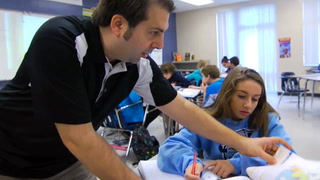
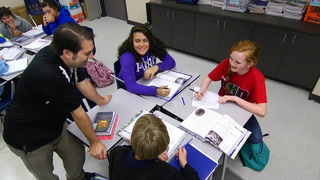
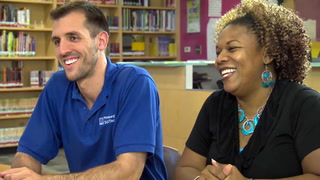
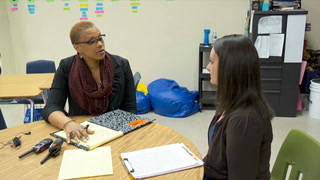
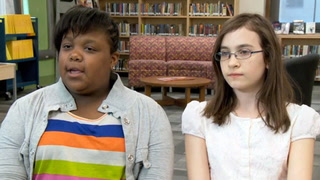








25 Comments
Elizabeth Owonikoko Jul 7, 2020 7:52pm
Teachers should always be open to new skills and new ideas. Teachers should be innovative to the extent of using videos and other forms of technology to improve their teaching. Also, teachers need to give and receive feedback on how they can teach and assess their students and control their class. I love the fact that teachers were observed using a rubric to enable detailed feedback on how they should handle each lesson and manage their classroom. This helps teachers improve their teaching to be more engaging and student-centered for a meaningful learning outcome.
Sol Branscum Feb 17, 2020 7:49pm
I enjoy this video because it shows the point of view of the teachers and their relationship with the students. The effective tools they use to help the students in achive their goals, for example the rubric observation system that helps see critically at the student work. The teacher and the administrator cominicate fluently and provide feedback, and this will help the teacher to improve his teaching technics and provide the students a better underestanding on their learning.
Sylvia Rodriguez Apr 25, 2019 10:40pm
I really enjoyed this video and how beneficial it is to receive feedback on how one as a teacher instructs and assesses their own students and how they control their classroom. I really like the rubric observation system because it definitely looks for specific targets and clarifies what to look for when observing a teacher, and gives more detailed feedback on what the teacher should work on with their lessons or how they communicate with students. Even recording a section of the evaluation is interesting because there are more ways to evaluate in detail and have the teacher receive a better understanding on how to improve.
Katherine Chapp Mar 24, 2018 7:17pm
Mary Jane Broumley Jun 15, 2016 3:51pm